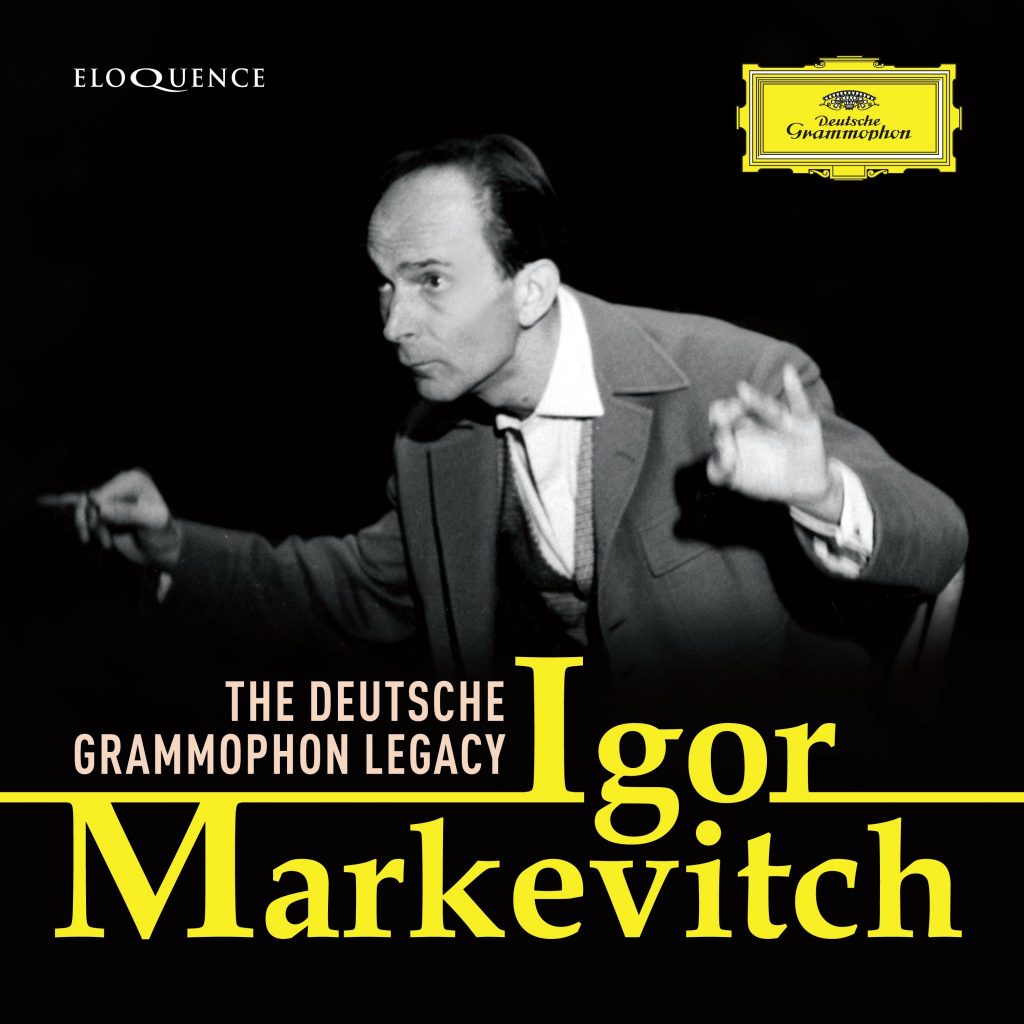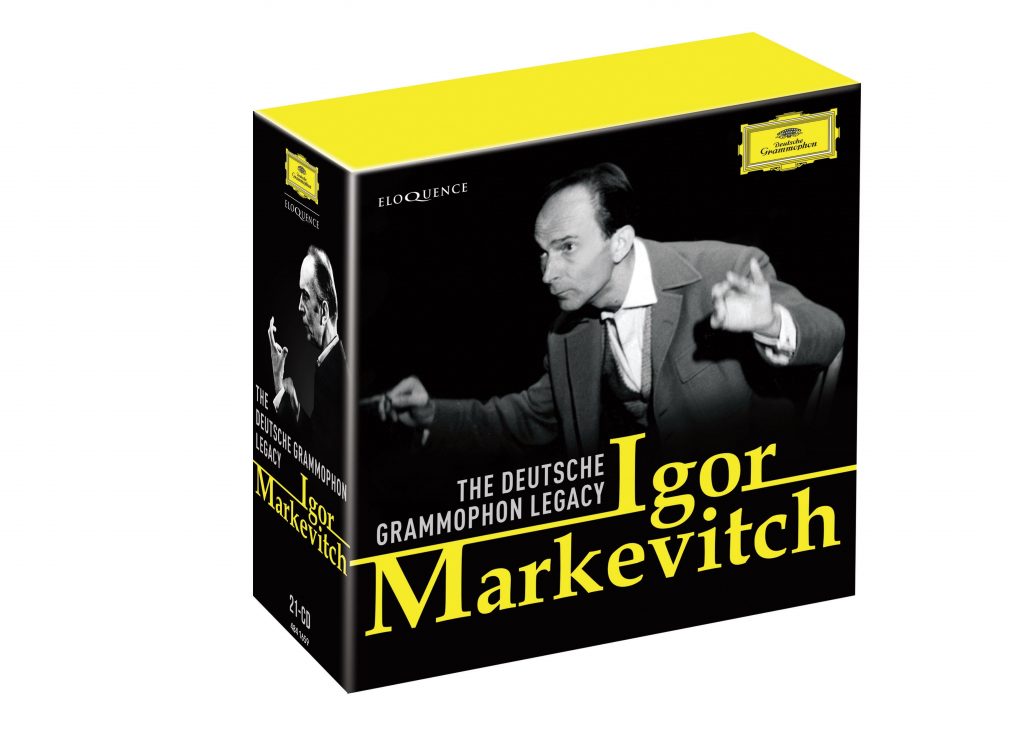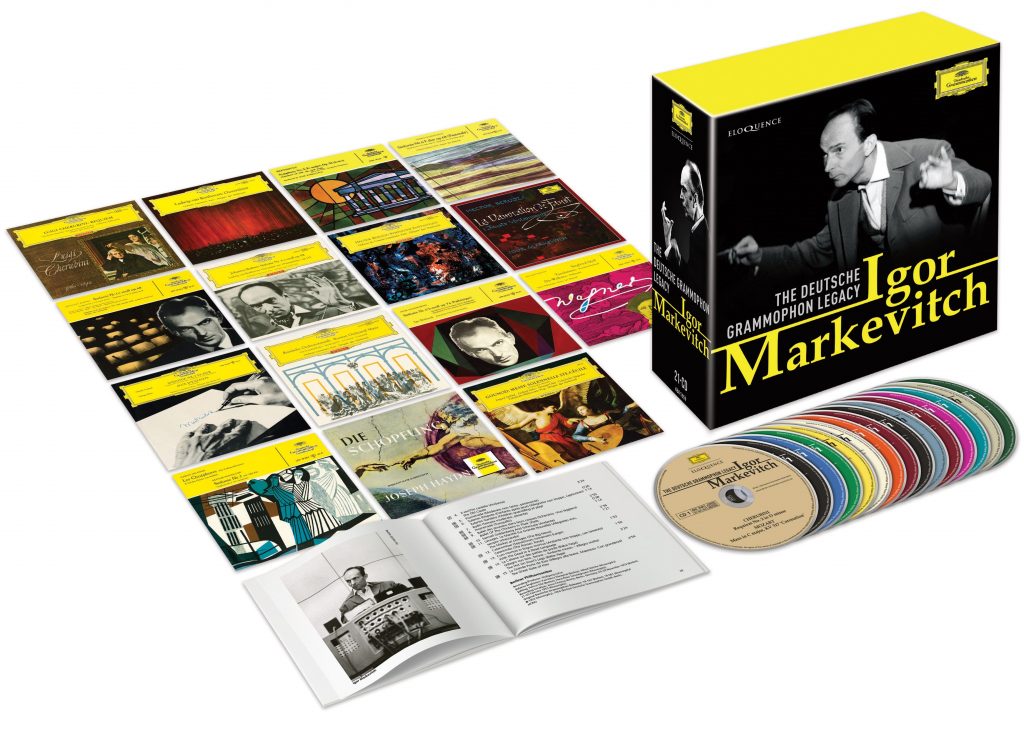


Issued complete for the first time, Igor Markevitch’s Deutsche Grammophon legacy from Berlin, Paris, Prague and New York, made between 1953 and 1965. ORIGINAL JACKETS | LIMITED EDITION.
‘I record so much I forget even my own records!’ Markevitch was a prolific recording artist for several labels, principal among them Deutsche Grammophon, HMV/EMI and Philips (Eloquence has also released a new, complementary collection of his Philips legacy). He felt more comfortable in the studio than many of his podium colleagues and viewed recording as the opportunity to bring out aspects of the score which could remain unheard by live audiences.
As a polymath, Markevitch turned from composition to conducting after the Second World War, and soon became one of the most in-demand conductors of his day, at home in a vast range of repertoire, equally at home in Classical-era symphonies by Haydn, Mozart and Beethoven, Romantic narratives by Berlioz, Wagner and Tchaikovsky, and contemporary Francophone composers such as Milhaud, Honegger and Roussel, bringing to each of them a sharp attack and acute sensitivity to colour and harmony.
Nowadays, many conductors follow Markevitch’s lead in refusing to specialise: he was a man ahead of his time, and his analytical mind was well suited to the precision of DG’s engineering teams. He worked with many of Europe’s finest orchestras, enjoying a productive relationship with the Berlin Philharmonic which resulted in many superb recordings from 1953–55, such as a pioneering album of symphonies by Schumann’s Swedish contemporary, Franz Berwald. Late in 1956, an invitation to conduct the successor to Toscanini’s NBC Symphony, the Symphony of the Air, resulted in lithe and athletic symphonic Beethoven (No. 3) and Brahms (No. 1)
Most of Markevitch’s DG legacy, however, was made in Paris, with the Lamoureux Orchestra whose fortunes he revived as chief conductor between 1957 and 1961. This relationship produced fleet and graceful, French-accented Beethoven (Pastoral Symphony and overtures) and Brahms (Symphony No. 4) and a superbly cast Damnation of Faust still widely considered as the finest interpretation of Berlioz’s ‘dramatic legend’ on record. Gounod, Bizet, Auber and Debussy receive no less vividly idiomatic treatment.
Markevitch was best known internationally as a fiery interpreter of Russian repertoire, represented here by virtuoso pieces of tone-colour and atmosphere from Lyadov, Rimsky-Korsakov, Borodin and Tchaikovsky, including two specialities, Francesca da Rimini and the ‘Pathétique’ Symphony. He could also galvanise choruses to heights of dynamic response: DG recorded him in Haydn’s Creation, Mozart’s Coronation Mass (twice, in Berlin and Paris, both reissued here) and the less familiar D minor Requiem of Cherubini and Gounod’s Saint Cecilia Mass. Recorded in Prague with the Czech Philharmonic in the early 1960s, these albums became Markevitch’s swansong to DG. Featuring original covers and a new essay by Peter Quantrill, this box includes much material long unavailable on CD.
CD 1
LUIGI CHERUBINI (1760–1842)
Requiem No. 2 in D minor
Czech Philharmonic Chorus & Orchestra
WOLFGANG AMADEUS MOZART (1756–1791)
Mass in C major, KV 317 ‘Krönungsmesse’ (1959 recording)
Maria Stader, soprano
Oralia Dominguez, contralto
Ernst Haefliger, tenor
Michel Roux, bass
Choeurs Elisabeth Brasseur
Orchestre des Concerts Lamoureux
CD 2
WOLFGANG AMADEUS MOZART (1756–1791)
Symphony No. 34 in C major, KV 338*
Symphony No. 38 in D major, KV 504 ‘Prague’*
Berliner Philharmoniker
Symphony No. 35 in D major, KV 385 ‘Haffner’*
CHRISTOPH WILLIBALD GLUCK (1714–1787)
Sinfonia in G major (Arr. Hans Gál)
Orchestre des Concerts Lamoureux
*mono recordings
CD 3
WOLFGANG AMADEUS MOZART (1756–1791)
Bassoon Concerto in B flat major, KV 191
Maurice Allard, bassoon
Orchestre des Concerts Lamoureux
JOSEPH HAYDN (1732–1809)
Sinfonia concertante in B flat major, H.I: 105*
Georges Alès, violin · André Remond, cello
Émile Mayousse, oboe · Raymond Droulez, bassoon
Orchestre des Concerts Lamoureux
DOMENICO CIMAROSA (1749–1801)
Concerto for two flutes in G major*
Aurèle Nicolet, Fritz Demmler, flutes
Berliner Philharmoniker
FRANZ SCHUBERT (1797 –1828)
Symphony No. 3 in D major, D.200*
Berliner Philharmoniker
*mono recordings
CD 4
LUDWIG VAN BEETHOVEN (1770–1827)
Overture: Egmont, Op. 84
Overture: Leonore III
Overture: Fidelio, Op. 72
Overture: Coriolan, Op. 62
Overture: Zur Namensfeier, Op. 115
Overture: Die Weihe des Hauses, Op. 124
Orchestre des Concerts Lamoureux
CD 5
LUDWIG VAN BEETHOVEN (1770–1827)
Symphony No. 3 in E flat major, Op. 55 ‘Eroica’*
Symphony of the Air
*mono recording
CD 6
LUDWIG VAN BEETHOVEN (1770–1827)
Symphony No. 6 in F major, Op. 68 ‘Pastoral’*
Orchestre des Concerts Lamoureux
*mono recording
CD 7
JOHANNES BRAHMS (1833–1897)
Symphony No. 1 in C minor, Op. 68*
Symphony of the Air
*mono recording
CD 8
JOHANNES BRAHMS (1833–1897)
Symphony No. 4 in E minor, Op. 98
Orchestre des Concerts Lamoureux
HECTOR BERLIOZ (1803–1869)
Harold en Italie, Op. 16*
Heinz Kirchner, viola
Berliner Philharmoniker
*mono recording
CD 9
HECTOR BERLIOZ (1803–1869)
Symphonie fantastique, Op. 14 (1961 recording)
LUIGI CHERUBINI (1760–1842)
Anacréon: Overture
DANIEL AUBER (1782–1871)
La muette de Portici, S.16: Overture
Orchestre des Concerts Lamoureux
CDs 10–11
HECTOR BERLIOZ (1803–1869)
La Damnation de Faust, Op. 24
Faust…………………………………………………………………………………………………Richard Verreau
Marguerite……………………………………………………………………………………………Consuelo Rubio
Méphistophélès……………………………………………………………………………………….Michel Roux
Brander………………………………………………………………………………………………….Pierre Mollet
Chœurs Elisabeth Brasseur
Chœur Enfants RTF
Orchestre des Concerts Lamoureux
CD 12
CHARLES GOUNOD (1818–1893)
Symphony No. 2 in E flat major*
GEORGES BIZET (1838–1875)
Jeux d’enfants, Op. 22*
CLAUDE DEBUSSY (1862–1918)
La Mer
Danse sacrée et Danse profane
Suzanne Cotelle, harp (Debussy: Danses)
Orchestre des Concerts Lamoureux
*mono recordings
CD 13
NIKOLAI RIMSKY-KORSAKOV (1844–1908)
Russian Easter Festival Overture, Op. 36*
Overture: May Night
Le Coq d’or – Suite
ALEXANDER BORODIN (1833–1887)
In the Steppes of Central Asia
ANATOLY LYADOV (1855–1914)
Fragment de l’Apocalypse – Tableau symphonique pour orchestre, Op. 66
MIKHAIL GLINKA (1804–1857)
Overture: Ruslan and Lyudmila
Orchestre des Concerts Lamoureux
*mono recordings
CD 14
PETER ILYICH TCHAIKOVSKY (1840–1893)
Symphony No. 6 in B minor, Op. 74 ‘Pathétique’*
Berliner Philharmoniker
Francesca da Rimini, Op. 32
Orchestre des Concerts Lamoureux
*mono recording
CD 15
RICHARD WAGNER (1813–1883)
Lohengrin: Preludes to Acts I & III
Tannhäuser: Overture
Orchestre des Concerts Lamoureux
Tannhäuser: Venusberg Music (Bacchanale)*
Siegfried Idyll*
Die Walküre: Walkürenritt*
Berliner Philharmoniker
*mono recordings
CD 16
DARIUS MILHAUD (1892–1974)
Les Choéphores, Op. 24*
Genevieve Moizan, soprano
Hélène Bouvier, mezzo-soprano (Electre)
Heinz Rehfuss, baritone (Oreste)
Claude Nollier, speaker
Chorale de l’Université de Paris
Georges Gitton, chorus master
ARTHUR HONEGGER (1892–1955)
Symphony No. 5 ‘Di tre re’*
ALBERT ROUSSEL (1869–1937)
Bacchus et Ariane, Op. 43 – Suite No. 2
Orchestre des Concerts Lamoureux
*mono recordings
CD 17
HECTOR BERLIOZ (1803–1869)
Symphonie fantastique, Op. 14 (1953 recording)*
MODEST MUSSORGSKY (1839–1881)
Pictures at an Exhibition (orch. Ravel)*
Berliner Philharmoniker
*mono recordings
CD 18
FRANZ BERWALD (1796–1868)
Symphony No. 3 in C major ‘Singulière’*
Symphony No. 4 in E flat major*
FRANZ SCHUBERT (1797–1828)
Symphony No. 4 in C minor, D.417 ‘Tragic’*
Berliner Philharmoniker
*mono recordings
CDs 19–20
JOSEPH HAYDN: (1732–1809)
Die Schöpfung, Hob. XI: 2*
Irmgard Seefried, soprano
Richard Holm, tenor
Kim Borg, bass
Chor der St. Hedwigs-Kathedrale, Berlin
Berliner Philharmoniker
WOLFGANG AMADEUS MOZART (1756–1791)
Mass in C major, KV 317 ‘Krönungsmesse’ (1954 recording)*
Maria Stader, soprano
Sieglinde Wagner, contralto
Helmut Krebs, tenor
Josef Greindl, bass
Chor der St. Hedwigs-Kathedrale
Berliner Philharmoniker
*mono recordings
CD 21
CHARLES GOUNOD (1818–1893)
Messe solennelle de Sainte Cécile*
Irmgard Seefried, soprano
Gerhard Stolze, tenor
Hermann Uhde, bass
Czech Philharmonic Chorus
Josef Veselka, chorus master
Czech Philharmonic Orchestra
IGOR MARKEVITCH
An Interview with Igor Markevitch*
*mono recordings
CD 1
Recording Producers: Hans Ritter, Karl-Heinz Schneider (Mozart); Hans Weber (Cherubini)
Balance Engineers: Walter Alfred Wettler, Werner Wolf (Mozart); Heinz Wildhagen (Cherubini)
Tape Editor: Helmut Najda (Cherubini)
Recording Locations: Salle de la Mutualité, Paris, France, 17 & 19–21 December 1959 (Mozart); Rudolfinum, Prague, Czech Republic, 7–8 December 1962 (Cherubini)
Original Deutsche Grammophon Releases: 138 131 (Mozart); 138 795 (Cherubini)
CD 2
1-7
Recording Producer: Wolfgang Lohse
Balance Engineer: Alfred Steinke
Editing: Helmut Elbl (Mozart: Symphony No. 34); Günter Hermanns (Mozart: Symphony No. 38)
Recording Location: Jesus-Christus-Kirche, Berlin, Germany, 22–28 February 1954
Original Deutsche Grammophon Release: 18 176
8-14
Recording Producers: Heinz Reinicke (Mozart); Karl-Heinz Schneider (Gluck)
Balance Engineers: Heinrich Keilholz (Mozart); Werner Wolf (Gluck)
Editing: Heinz Reinicke (Mozart)
Recording Location: Théâtre des Champs-Elysées, Paris, France, 28 October & 6 November 1957 (Mozart); Salle Pleyel, Paris, France, 7 June 1958 (Gluck)
Original Deutsche Grammophon Releases: 19 169 (Mozart); 19 169 (Gluck)
CD 3
Recording Producers: Hans Ritter, Karl-Heinz Schneider (Mozart); Heinz Reinicke (Haydn); Wolfgang Lohse (Cimarosa, Schubert)
Balance Engineers: Walter Alfred Wettler, Werner Wolf (Mozart); Harro-Hell Michna (Haydn); Werner Heidrich (Cimarosa); Alfred Steinke (Shubert)
Editing: Günter Hermanns (Cimarosa, Schubert)
Recording Locations: Jesus-Christus-Kirche, Berlin, Germany 26–28 February 1954 (Schubert), 19, 20 December 1954 (Cimarosa); Théâtre des Champs Elysées, Paris, France, 29, 30 October 1957 (Haydn); Polydor-Studio, Paris, France, 4–5 December 1958 (Mozart)
Original Deutsche Grammophon Releases: 138 131 (Mozart); 19 169 (Haydn); 37 138 (Cimarosa); 18 221 (Schubert)
CD 4
Recording Producer: Hans Ritter
Balance Engineer: Werner Wolf
Editing: Günter Hermanns
Recording Location: Polydor-Studio, Paris, France, 25 November 1958 (Coriolan), 26 November 1958 (Egmont, Leonore, Zur Namensfeier), 28 November 1958 (Die Weihe des Hauses), 29 November 1958 (Fidelio)
Original Deutsche Grammophon Releases: 138 039 (Leonore, Coriolan, Fidelio, Die Weihe des Hauses); 138 032 (Zur Namensfeier)
CD 5
Recording Producer: Thomas Frost
Balance Engineers: Thomas Frost, Heinrich Keilholz
Recording Location: Manhattan Center, New York, USA, 19–21 December 1956 & 30 January 1957
Original Deutsche Grammophon Release: 18 350
CD 6
Recording Producer: Heinz Reinicke
Balance Engineer: Heinrich Keilholz
Editing: Hans-Peter Schweigmann, Heinz Reinicke
Recording Location: Théâtre des Champs-Elysées, Paris, France, 21–25 October 1957 & 8 November 1957
Original Deutsche Grammophon Release: 18 468
CD 7
Recording Producer: Thomas Frost
Balance Engineers: Thomas Frost, Heinrich Keilholz
Recording Location: Manhattan Center, New York, United States, 19–21 December 1956
Original Deutsche Grammophon Release: 18 364
CD 8
Brahms
Recording Producer: Hans Ritter
Balance Engineer: Werner Wolf
Editing: Günter Hermanns
Recording Location: Polydor-Studio, Paris, France, 20–24 November 1958
Original Deutsche Grammophon Release: 138 032
Berlioz
Recording Producer: Wolfgang Lohse
Balance Engineer: Werner Grimme
Editing: Günter Hermanns
Recording Location: Jesus-Christus-Kirche, Berlin, Germany, 8–15 December 1955
Original Deutsche Grammophon Release: 18 299
CD 9
Executive Producer: Elsa Schiller
Recording Producer: Hans Ritter
Balance Engineer: Günter Hermanns
Editing: Rolf Peter Schröder
Recording Location: Salle de la Mutualité, Paris, France, 11–17 January 1961 (Berlioz), 17–18 (Cherubini, Auber) January 1961
Original Deutsche Grammophon Releases: 138 712 (Berlioz); 447 406-2 (Cherubini, Auber)
CDs 10–11
Executive Producer: Prof. Elsa Schiller
Recording Producer: Hans Ritter
Balance Engineers: Werner Wolf, Günter Hermanns
Editing: Günter Hermanns
Recording Location: Salle de la Mutualité, Paris, France, 4–6 & 12–14 May 1959
Original Deutsche Grammophon Release: 138 099–100
CD 12
Recording Producers: Heinz Reinicke (Gounod, Bizet); Hans Ritter (Debussy)
Balance Engineers: Heinrich Keilholz (Gounod, Bizet); Werner Wolf (Debussy)
Editing: Hans-Peter Schweigmann, Heinz Reinicke (Gounod, Bizet)
Recording Locations: Théâtre des Champs Elysées, Paris, France, 8, 10, 11 November 1957 (Gounod, Bizet); Salle de la Mutualité, Paris, France, 2 March (Debussy: Danses), 2–3 May 1959 (Debussy: La Mer)
Original Deutsche Grammophon Release: 18 469 (Gounod, Bizet); 138 073 (Debussy)
CD 13
Recording Producers: Karl-Heinz Schneider (Rimsky-Korsakov, Borodin, Glinka); Hans Ritter (Lyadov)
Balance Engineers: Werner Wolf (Rimsky-Korsakov); Walter Alfred Wettler (Borodin, Glinka); Harald Baudis (Lyadov)
Recording Locations: Salle Pleyel, Paris, France, 12 November 1957 (Russian Easter Festival Overture), 8–10 (Le Coq d’or), 11 (May Night) June 1958; Salle de la Mutualité, Paris, France, 15 December 1959 (Borodin, Glinka), 23 May 1960 (Lyadov)
Original Deutsche Grammophon Releases: 19 170 (Russian Easter Festival Overture); 133 006 (Le Coq d’or, May Night), 136 225 (Borodin, Lyadov, Glinka)
CD 14
Recording Producers: Wolfgang Lohse (Symphony No. 6); Karl-Heinz Schneider (Francesca da Rimini)
Balance Engineers: Karlheinz Westphal (Symphony No. 6); Walter Alfred Wettler (Francesca da Rimini)
Editing: Helmut Elbl, Karlheinz Westphal (Symphony No. 6)
Recording Locations: Jesus-Christus-Kirche, Berlin, Germany, 1–4 December 1953; Salle de la Mutualité, Paris, France, 9, 15 December 1959
Original Deutsche Grammophon Releases: 18 193 (Symphony No. 6); 136 225 (Francesca da Rimini)
CD 15
Recording Producers: Wolfgang Lohse (Tannhäuser: Venusberg Music); Karl-Heinz Schneider (Lohengrin: Prelude to Act I, Tannhäuser: Overture); Hans Ritter (Lohengrin: Prelude to Act II); Wolfgang Lohse, Karl-Heinz Schneider (Die Walküre)
Balance Engineers: Werner Wolf (Lohengrin – Preludes to Acts I & II, Tannhäuser: Overture); Werner Heidrich (Die Walküre); Werner Heidrich, Alfred Steinke (Tannhäuser: Venusberg Music); Werner Grimme, Heinrich Keilholz (Siegfried Idyll)
Editing: Günter Hermanns (Lohengrin – Prelude to Act II, Tannhäuser: Venusberg Music, Die Walküre)
Recording Locations: Salle Pleyel, Paris, France, 12, 13 June 1958 (Tannhäuser: Overture), 13 June 1958 June 1958 (Lohengrin: Prelude to Act I), 19 November 1958 (Lohengrin: Prelude to Act II); Jesus-Christus-Kirche, Berlin, Germany, 7–8 December 1954 (Siegfried Idyll), 14–15 December 1954 (Tannhäuser: Venusberg Music), 19–20 December 1954 (Die Walküre)
Original Deutsche Grammophon Releases: 133 010 (Lohengrin – Preludes to Acts I & II, Tannhäuser Overture); 19 024 (Tannhäuser: Venusberg Music, Siegfried Idyll, Die Walküre)
CD 16
Executive Producers: Hans-Peter Schweigmann (Milhaud, Honegger), Günter Hermanns (Roussel)
Recording Producers: Karl-Heinz Schneider (Milhaud, Honegger); Hans Ritter (Roussel)
Balance Engineers: Heinrich Keilholz, Harro-Hell Michna (Milhaud, Honegger); Werner Wolf (Roussel)
Recording Locations: Salle Wagram, Paris, France, 16, 18–19, 22 March 1957 (Milhaud), 25–27 March 1957 (Honegger); Salle de la Mutualité, Paris, France 2–3 December 1958 (Roussel)
Original Deutsche Grammophon Releases: 18 385 (Milhaud, Honegger); 138 073 (Roussel)
CD 17
Recording Producer: Wolfgang Lohse
Balance Engineers: Karl-Heinz Westphal (Berlioz); Alfred Steinke (Mussorgsky)
Editing: Helmut Eibl (Berlioz); Hans-Peter Schweigmann (Mussorgsky)
Recording Location: Jesus-Christus-Kirche, Berlin, Germany, 23–29 November 1953 (Berlioz), 21–25 February 1953 (Mussorgsky)
Original Deutsche Grammophon Releases: 18 167 (Berlioz); 16 061 (Mussorgsky)
CD 18
Executive Producer: Günter Hermanns (Berwald)
Recording Producers: Klaus Fischer-Dieskau (Berwald); Wolfgang Lohse (Schubert)
Balance Engineers: Werner Grimme (Berwald); Alfred Steinke (Schubert)
Editing: Günter Hermanns (Schubert)
Recording Location: Jesus-Christus-Kirche, Berlin, Germany, December 1954 (Schubert), December 1955 (Berwald)
Original Deutsche Grammophon Releases: 18 317 (Berwald); 18 221 (Schubert)
CDs 19–20
Haydn
Recording Producer: Wolfgang Lohse
Balance Engineer: Alfred Steinke
Editing: Eva Keilholz
Recording Location: Jesus-Christus-Kirche, Berlin, Germany, 6–11 May 1955
Original Deutsche Grammophon Release: 18 489–490
Mozart
Recording Producer: Wolfgang Lohse
Balance Engineer: Heinrich Keilholz
Editing: Helmut Elbl
Recording Location: Jesus-Christus-Kirche, Berlin, Germany, 18–21 February 1954
Original Deutsche Grammophon Release: 16 096
CD 21
Gounod
Executive Producer: Otto Gerdes
Recording Producer: Hans Weber
Balance Engineer: Günter Hermanns
Recording Engineer: Guenther Dieckmann
Editor: Rolf Peter Schroeder
Recording Location: Rudolfinum, Prague, Czech Republic, 26–29 June 1965
Original Deutsche Grammophon Release: 139 111
Interview
Recorded: Fine Recording Studios, New York, USA, 2 August 1957 (Decca Tape DS2673)
Original Deutsche Grammophon Release: 474 400-2: 2003
‘There has never been a Faust as totally idiomatic as this one. The score came home to Paris, as it were, not simply because of geography but more importantly, for the pure Gallic singing by the principals and the wonderfully piquant orchestral playing by the still traditional-sounding Orchestre Lamoureux … None of this would count for much if Markevitch weren’t such a superb Berlioz interpreter … equally superb Harold in Italy.’ Fanfare, March 2018
‘The brilliant, and brilliantly recorded, 1961 Markevitch reading builds from primly shaped, sharply etched detail in nervous, impetuous feints.’ Fanfare, September 1989 (Symphonie fantastique)
‘The most restrained approach to the flamboyant work on records … Markevitch’s presentation of the Credo remains my favorite.’ Fanfare, September 1989 (Gounod: St. Cecilia Mass)
‘This was the recording of The Creation in its day … direct and powerful … the standout performance is by Irmgard Seefried, whose pure, limpid soprano exudes sincerity throughout.’ Fanfare, September 2016
‘Markevitch is here the dedicated and devoted servant of the music … All five overtures receive unqualifiedly excellent performances.’ Stereo Review, July 1960 (Beethoven: Overtures)
‘With this release, Markevitch moves up alongside Munch and Beecham to the very forefront of insightful Berlioz conductors … The Lamoureux orchestra sounds for all the world like one of the great orchestras of the world, and the chorus covers itself with glory.’ Stereo Review, July 1960 (Berlioz: La Damnation de Faust)
‘There is a maximum of excitement, even nervous tension … worth hearing, especially for Markevitch’s intensity and his concentration on instrumental clarity.’ Stereo Review, January 1971 (Debussy, Roussel)
‘Markevitch’s vintage version, recorded in the mid-1960s, still sounds remarkably well. In his straight-faced way Markevitch makes the incongruity of Gounod’s jolly and vulgar tunes all the more delectable, and soloists, chorus and orchestra are all first rate.’ *** Penguin Guide, 1992 (Gounod: St. Cecilia Mass)
‘The brilliant and exciting mono recording of Harold in Italy by Heinz Kirchner, a first-rate soloist, with the Berlin Philharmonic under Markevitch, brings a riveting final orgy.’ Penguin Guide, 1994 (Harold in Italy)
‘A marvel: the Coronation Mass directed by Markevitch … and especially the sublime Maria Stader in the Agnus dei solo.’ Diapason, August 1990
‘An exceptional interpretation.’ Diapason, September 1965 (Cherubini: Requiem)




